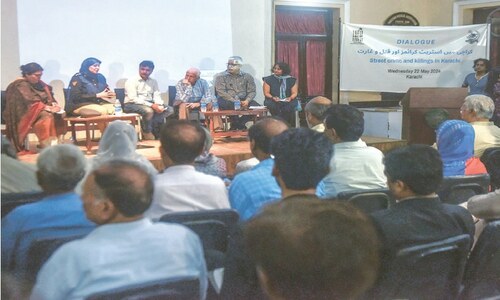KARACHI: Dhoop apnay hissay ki, a poetry collection from a young and promising poet, Ishrat Afreen, at present based in US, was launched on Monday. The present volume appeared 20 years after the publication of her first poetry collection, Kunj peelay phoolon ka.
Among those who spoke on Afreen’s poetry and admired her distinct style included Kishwer Naheed and Iftekhar Arif from Islamabad, Prof Saher Ansari and Intezar Hussain.
Kishwer adoringly recalled the appearance of Afreen’s earliest verses and was happy to note that she had developed over the years growing into a remarkable poet, as the former expected.
Saher Ansari admired Afreen for her closeness to her culture, choosing her own vocabulary which suited her images. Her poetry, Ansari said, was unique and as fresh as nature itself.
Iftekhar Arif dealt with Afreen’s ghazals and found the same adoring, reminding her, as well as many other ghazal poets, that ‘qafia paimai’ (using words of similar harmony without caring about the meaning) was no art. Afreen’s poetry, he said, carried the grief of migration and a feeling of being rootlessness which, he thought, was a trend found universally. The nostalgia in literature, particularly in poetry prevailed in those countries where most part of the population carried the baggage of migration and the melancholy attached to it, he said.
Intezar Hussain, who had received the book somewhat late and couldn’t thoroughly go through it, however, found some verses highly appealing, for example, the illustration of the town where the poet lived –- the Katcha houses, narrow lanes and a shadow of silence hanging around. The whole scene was like that of a picture and the only thing moving appeared the children running after each other in the lanes. Suddenly the scene changes. With the thunderous sound of guns, children succumb to their fearful silence, men and women who were unmoved till that time run for their lives and the town, its walls and lanes turning red with human blood. “It was not my place, I had lived and loved” was the reaction of the grief-stricken poet.
Narrating the merits of the verse, Intezar Hussain took note of Iftekhar Arif’s remarks about nostalgia in literature — found in most uprooted countries – and said, if nostalgia was a sickness, then he (Intezar Hussain) was its first victim.
At the outset, Shaheda Hasan briefly recalled her loving association with Ishrat Afreen, spread over decades, and admired the diction and vocabulary Afreen had employed to convey her feelings to her readers. The present collection reflected the maturity she had attained over the years and the vision of an intellectual.
Asif Farrukhi thanked the guests and the audience.—H.A.














































Dear visitor, the comments section is undergoing an overhaul and will return soon.